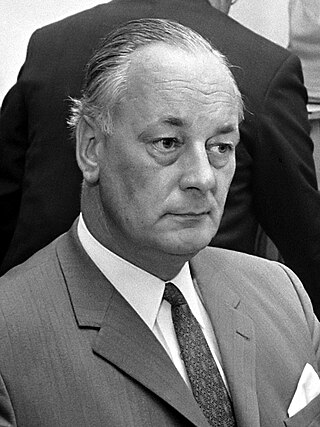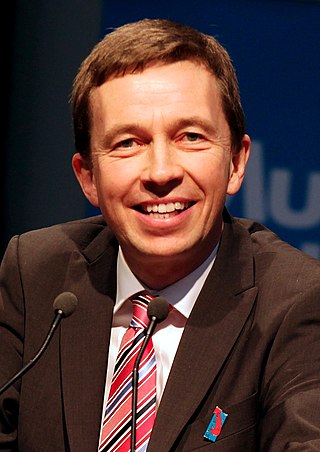Related Research Articles

The Free Democratic Party is a liberal political party in Germany.

The Homeland, previously known as the National Democratic Party of Germany, is a far-right Neo-Nazi and ultranationalist political party in Germany.
The Party for a Rule of Law Offensive, Rule of Law State Offensive Party, Party for the Promotion of the Rule of Law, Law and Order Offensive Party, or Party of Law and Order Offensive, commonly known as the "Schill party" from 2000 to 2003, was a minor right-wing populist party in Germany, mainly active in the state of Hamburg, that ran on a platform of law and order. It was founded in July 2000 by the judge Ronald Schill and was temporarily very successful in Hamburg, winning 19.4% of the votes in the 2001 state election and joining a coalition government. After the centre-right coalition collapsed and Schill left the party in 2003, it quickly lost support. Attempts to expand to other states or the federal level were unsuccessful. It may therefore be considered a "flash party" or protest party.

The Landtag of Bavaria, officially known in English as the Bavarian State Parliament, is the unicameral legislature of the German state of Bavaria. The parliament meets in the Maximilianeum in Munich.
The German Conservative Party was a right-wing political party of the German Empire founded in 1876. It largely represented the wealthy landowning German nobility and the Prussian Junker class.
In the fourteen years the Weimar Republic was in existence, some forty parties were represented in the Reichstag. This fragmentation of political power was in part due to the use of a peculiar proportional representation electoral system that encouraged regional or small special interest parties and in part due to the many challenges facing the nascent German democracy in this period.
This article aims to give a historical outline of liberalism in Germany. The liberal parties dealt with in the timeline below are, largely, those which received sufficient support at one time or another to have been represented in parliament. Not all parties so included, however, necessarily labeled themselves "liberal". The sign ⇒ denotes another party in that scheme.

The Sudeten German Party was created by Konrad Henlein under the name Sudetendeutsche Heimatfront on 1 October 1933, some months after the First Czechoslovak Republic had outlawed the German National Socialist Workers' Party. In April 1935, the party was renamed Sudetendeutsche Partei following a mandatory demand of the Czechoslovak government. The name was officially changed to Sudeten German and Carpathian German Party in November 1935.
This article gives an overview of liberalism in Austria. It is limited to liberal parties with substantial support, mainly proved by having had representation in parliament. For inclusion in this scheme it isn't necessary that parties labeled themselves as a liberal party.
The German Right Party was a far-right political party that emerged in the British zone of Allied-occupied Germany after the Second World War.

Adolf von Thadden was a German far-right politician. Born into a leading Pomeranian landowning family, he was the half-brother of Elisabeth von Thadden, a prominent critic of the Nazis who was executed by the Nazi government in September 1944.
Friedrich-Georg "Fritz" Thielen was a German politician with the Christian Democratic Union (CDU), the German Party, the Gesamtdeutsche Partei and the National Democratic Party of Germany (NPD).
Libertas Germany is a eurosceptic German political party founded in 2009. It is a member of the pan-European movement Libertas.eu established to impede the Lisbon Treaty.

Reinhold Wulle was a German Völkisch politician and publicist active during the Weimar Republic.
The Liberal Union was a short-lived liberal party in the German Empire. It originated in 1880 as a breakaway from the National Liberal Party and so was also called the Secession. It merged with the left liberal German Progress Party to form the German Free-minded Party in 1884.

The German Party was a national-conservative political party in West Germany active during the post-war years. The party's ideology appealed to sentiments of German nationalism and nostalgia for the German Empire.
The German Party is a minor national conservative German political party. It sees itself as the successor of the defunct conservative German-Hanoverian Party and the German Party established in 1947, which until 1961 was represented in the Bundestag parliament.

Alternative for Germany is a right-wing populist political party in Germany. AfD is known for its Euroscepticism, as well as for opposing immigration to Germany. As a right-wing party, AfD is commonly positioned on the radical right, a subset of the far-right, within the family of European political parties that does not oppose democracy.

Bernd Lucke is a German economist, professor, author and former politician. He was a co-founder of the Alternative für Deutschland (AfD) in 2013 and served as the party's federal chairman. He was elected a Member of the European Parliament (MEP) for AfD in 2014.
August Haußleiter was a German politician and journalist. After his exclusion from the Bavarian Christian Social Union in 1949 he spent three decades as a right-wing political activist, on many occasions positioned beyond the frontiers of West Germany's consensual political mainstream. During the 1980s he remained politically active, but now as a somewhat unconventional member of the German Green party. He is also the mentor of the Finnish Greens (@vihreat)
References
- ↑ Gerhard A. Ritter and Merith Niehuss, Wahlen in Deutschland 1946-1991. Ein Handbuch. Munich: C.H. Beck, 1991, p. 163.